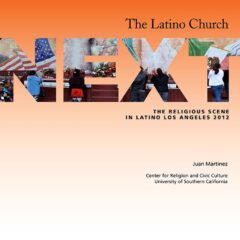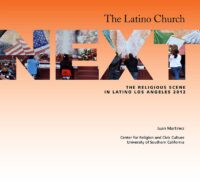Historically, Latinos have been in charge of very few institutions in Los Angeles. Until recently, Latinos were even on the margins of Catholicism in the region. The only major exception has been Latino Pentecostal churches. Most Latino Protestant congregations are small and many have part-time pastors. Those linked to mainline or evangelical denominations might be dependent on their denominations for financial support and some churches have ministries among poor and immigrant Latinos, thought the churches are not led by Latinos themselves. But Latino Pentecostal churches led and funded by Latinos themselves are thriving throughout the city. Some feel as transitory as some of their members. They often have to move to new locations when they lose their leases. But these congregations are also growing. All of the largest Latino Protestant churches in the city are Pentecostal. Women are key players in these congregations, often making up 70 percent or more of the active membership. A small but growing number of women are becoming pastors of these churches. The Latino Bible Institutes and the local seminaries preparing Latino leaders are both seeing a growing number of women students. Most Pentecostal churches, and some other denominations, affirm women in leadership. But it is this generation that is making room for women to take pastoral leadership.
Pentecostal and evangelical growth has created an interesting situation in Los Angeles. Even though there are more than four times as many Latino Catholics as Latino Pentecostals there are many more Latino Pentecostal pastors than Latino priests. Part of the difference has to do with ordination requirements; becoming a priest is much more complicated and demands a much higher commitment than becoming a Pentecostal preacher. But it also has to do with the fact that most Latino Protestant churches have Latino pastors, something that is not nearly as common among Roman Catholics. They provide spaces for otherwise marginalized people to learn and practice leadership. People who have a sense of calling can become pastors, even if they have not had access to formal theological education or cannot qualify because they do not have enough formal education, they cannot study in English, or are undocumented. Because the churches depend on lay leadership, many working-class people have the opportunity to develop leadership skills even though they might never have an opportunity in other settings. In many churches the pastoral leadership is literally a person from among the people. It also has to do with how Latino Catholics and Protestants express their faith. On any given Sunday morning in Los Angeles you are likely to find more Latino Protestants in church than Latino Catholics. The local church or parish plays a very different role among Latino Protestants and Catholics. For many Latino Catholics Sunday mass is the place for “official” expressions of the faith, while for most Latino Protestants church services are about connecting the community of believers. Latino Catholics participate in religious festivals and in many popular expressions of their faith. But weekly mass is not necessarily considered a crucial expression of religious commitment.
Clearly, Catholics and Pentecostals have very different views of the church. How is that difference affecting Christian expressions in the Latino community? Pentecostalism is growing rapidly in the Latino community and drawing people from other Christian expressions. Since Pentecostal theology makes room for church communities led by Latinos, will Pentecostalism play a crucial role in ethnic identity maintenance? What are the advantages and disadvantages for the Latino community of having churches led by lay people or people with limited theological education? Will the Catholic Church be able to recruit enough Latino priests at least to approach the ratio of Latino Catholics in the diocese of Los Angeles? If the diocese cannot recruit enough priests will it make more room for lay leaders at the parish level?
Juan Martinez is a former fellow with the USC Center for Religion and Civic Culture.


